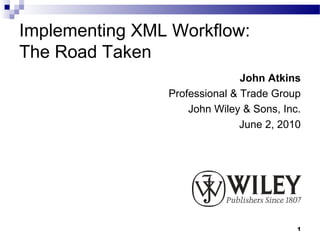
334 seminar2 johnatkins
- 1. Implementing XML Workflow: The Road Taken John Atkins Professional & Trade Group John Wiley & Sons, Inc. June 2, 2010 1
- 2. About John Wiley & Sons Professional and Trade Group Annual Books: 1500 titles; ~600,000 pages Annual Journals: 65 titles; 527 issues; ~23,000 pages Subjects: Business, Technology, Travel, Cooking, Architecture, Psychology, Education 2
- 3. Our Goals To have structured content available Immediate customer use For future retrieval and reuse To integrate XML into the editorial and production process XML is as much a priority as the printed content John Atkins/John Wiley & Sons, Inc. Society for Scholarly Publishing, June 2, 2010 3
- 4. Our Strategy Get organized! Began with multiple DTDs Books, journals, online books, articles We spent several years developing one solution for everything: Schema John Atkins/John Wiley & Sons, Inc. Society for Scholarly Publishing, June 2, 2010 4
- 5. Considerations for Developing Business Requirements What does the customer want? What would I want to be able to search, retrieve, and reuse? Am I taking into account all variant content structure (books, MRWs, journals, etc.) Can I standardize like elements across publications to create custom publications? How granular do I need to get? (rights, pedagogy, marketing) John Atkins/John Wiley & Sons, Inc. Society for Scholarly Publishing, June 2, 2010 5
- 6. How to Get XML? Up or down stream? Write manuscripts in XML? Pro – you have valid XML through entire publishing cycle Con – infrastructure/resources/training - $$$$ Convert content to XML later? Pro – leaves more of editorial process intact; experts handle the XML Con - Separating editorial processes from XML requires reinterpretation. John Atkins/John Wiley & Sons, Inc. Society for Scholarly Publishing, June 2, 2010 6
- 7. Word Up-stream! Most authors comfortable with Word Developed templates to help structure manuscripts in production Word is ubiquitous Styling manuscripts more similar to traditional typemarking Style names describe semantic function Formatting provides visual cues but does not reflect book design Editorial focus on content, not designing in Word John Atkins/John Wiley & Sons, Inc. Society for Scholarly Publishing, June 2, 2010 7
- 8. Word Mss John Atkins/John Wiley & Sons, Inc. Society for Scholarly Publishing, June 2, 2010 8
- 9. Design John Atkins/John Wiley & Sons, Inc. Society for Scholarly Publishing, June 2, 2010 9
- 10. Where’s the XML? Created by suppliers who specialize in XML preparation Expertise doesn’t have to be in-house Use style names in our template to automate/facilitate conversion process John Atkins/John Wiley & Sons, Inc. Society for Scholarly Publishing, June 2, 2010 10
- 11. XML John Atkins/John Wiley & Sons, Inc. Society for Scholarly Publishing, June 2, 2010 11
- 12. John Atkins/John Wiley & Sons, Inc. Society for Scholarly Publishing, June 2, 2010 12
- 13. Two books in one? Processing full-text XML can be nearly equivalent to another book production cycle How do you streamline the process so that book and XML are updated in parallel? John Atkins/John Wiley & Sons, Inc. Society for Scholarly Publishing, June 2, 2010 13
- 14. Our XML Solution All titles go into XML workflow Template provides skeletal structure to facilitate XML creation Weconvey special XML considerations separately Compositors create XML file first, and use it to drive book layout XML is ready at/near publication John Atkins/John Wiley & Sons, Inc. Society for Scholarly Publishing, June 2, 2010 14
- 15. Advantages XML is on-hand when needed most Post-processing on request takes several weeks longer Process is predictable and manageable And less expensive We’re building an extensive XML library John Atkins/John Wiley & Sons, Inc. Society for Scholarly Publishing, June 2, 2010 15
- 16. Trade-offs Word is flat, XML is multi-dimensional Conversion requires some decision-making for the compositors (interpretation!). Quality control must be considered Not everything is used John Atkins/John Wiley & Sons, Inc. Society for Scholarly Publishing, June 2, 2010 16
- 17. Where We Are Now >90% of our content is converted to XML for future use Editors are trying alternative publishing formats Custom publications Premium Web content Whatever comes next… John Atkins/John Wiley & Sons, Inc. Society for Scholarly Publishing, June 2, 2010 17
- 18. Words of advice… Try to get the most accurate business requirements from the start What do you need? How much detail? How will you get it? Updates are complicated and time-consuming to implement Capture semantics – not design Be flexible: There will be changes, so allow for them Build relationships with suppliers with expertise - we didn’t get here on our own John Atkins/John Wiley & Sons, Inc. Society for Scholarly Publishing, June 2, 2010 18
- 19. Above all… Get organized It will save you lots of time downstream John Atkins/John Wiley & Sons, Inc. Society for Scholarly Publishing, June 2, 2010 19
- 20. <slide position=“last”> <p> THANK YOU </p> <p> And good luck!</p> </slide> John Atkins/John Wiley & Sons, Inc. Society for Scholarly Publishing, June 2, 2010 20
Notes de l'éditeur
- 1000 are outsourceable 90% in XML-first workflow
- WileyML is very detailed, so we haven’t been able to distribute work to our regular base of composition houses.
- Checking the XML can be a very detailed and time-consuming process, especially for complex books with lots of math, art, tables, etc., because it truly is like a new book. We don’t have the resources to run two production cycles, so we needed to find ways to streamline the process and make it parallel with book production.
- Point 1: Need business leadership as well as production. Need to make business-wide decisions upfront about how you’ll use tags and what will be the ultimate benefit.